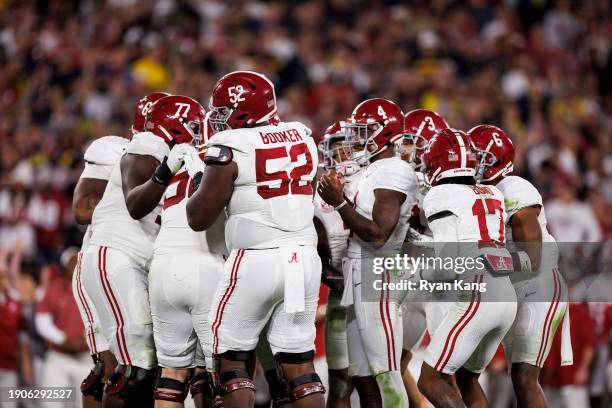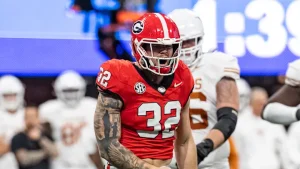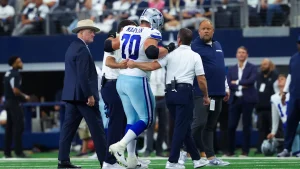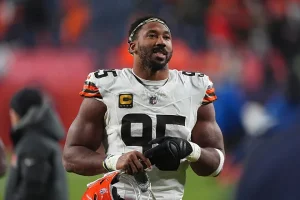
PASADENA, CALIFORNIA - JANUARY 01: The Alabama Crimson Tide huddle on offense in overtime during the CFP Semifinal Rose Bowl Game against the Michigan Wolverines at Rose Bowl Stadium on January 1, 2024 in Pasadena, California. (Photo by Ryan Kang/Getty Images)
College Football Insider Believes Ryan Grubb Changes Alabama’s Culture In One Way
Ryan Grubb’s Arrival: A New Era for Alabama Football
The Alabama Crimson Tide is one of the most storied programs in college football history, with a legacy built on dominance, tradition, and excellence. However, in an ever-evolving college football landscape, even the most successful programs need to adapt and evolve. In that context, Alabama’s recent hire of Ryan Grubb has generated significant buzz among college football insiders. Grubb, an offensive coordinator with a reputation for innovation and efficiency, could be the key to changing the culture at Alabama, particularly in one critical area: offensive philosophy.
Grubb, whose coaching journey has taken him through multiple programs, has garnered attention for his work with Washington’s offense. His ability to develop quarterbacks, create dynamic offensive schemes, and build a high-powered offense could inject a fresh perspective into Alabama’s historically dominant but at times conservative offensive culture.
While Alabama has long been known for its stout defense and physical running game, Grubb’s influence promises to reshape how the Crimson Tide approach offense. His ability to introduce a more dynamic, pass-heavy approach could mark a paradigm shift in the culture surrounding Alabama football.
The Tradition of Alabama Football: A Program Built on Defense and Power Running
To understand the potential impact Grubb could have, it’s essential to first examine Alabama’s culture under Nick Saban, which has been rooted in a philosophy of toughness, discipline, and a focus on defense and the running game. Under Saban, the Crimson Tide has established itself as one of the premier programs in college football. Alabama has built its identity around physicality—dominating the line of scrimmage, controlling the clock with a punishing ground game, and using an elite defense to stifle opposing offenses.
For years, Alabama’s offense was designed to complement its defense. The Tide would often lean on a strong running game, featuring powerful backs who could grind out yards and control the tempo of the game. While Alabama’s quarterbacks have had their moments of excellence, the program has not been known for its high-flying passing attacks.
Under this formula, Alabama’s offense has been efficient but not necessarily explosive. The emphasis has always been on ball control, field position, and wearing down opponents physically. While successful, this style of play has at times been seen as somewhat dated in a college football landscape that increasingly values spread offenses, up-tempo play, and dynamic passing attacks.
Ryan Grubb’s Offensive Philosophy: A Breath of Fresh Air
Enter Ryan Grubb. Grubb’s coaching career, particularly his work as the offensive coordinator at Washington, has focused on creating an offense that is both balanced and explosive. His philosophy prioritizes a fast-paced, pass-first approach, but he also understands the importance of maintaining a balanced attack. Grubb’s offenses have consistently ranked among the best in the Pac-12, with a focus on developing quarterbacks and creating mismatches in the passing game.
What makes Grubb’s approach particularly intriguing is his ability to adjust his offense to the strengths of his players. While he prefers to pass the ball, he is not wedded to one specific style. His adaptability allows him to tailor his offense to the talent at his disposal, whether that means featuring a dynamic quarterback in the passing game or leaning on a running back in certain situations.
Grubb’s ability to develop quarterbacks is one of his most notable traits. At Washington, he helped turn Michael Penix Jr. into one of the top quarterbacks in the country, orchestrating an offense that was both fast and efficient. Under Grubb’s guidance, Penix had one of the most productive seasons of any quarterback in college football, showcasing both arm strength and accuracy. This ability to develop quarterbacks will likely play a significant role in Alabama’s future success, particularly as the program looks to replace veterans at the position and develop the next generation of quarterbacks.
In addition to his work with quarterbacks, Grubb’s offenses are known for being multiple and creative. He is not afraid to use a variety of formations, motions, and shifts to create confusion for opposing defenses. This versatility allows him to exploit mismatches and keeps defenses on their toes, which could be a significant departure from the more predictable offensive strategies that have defined Alabama football in recent years.
Grubb’s Influence on Alabama’s Culture: Modernizing the Offense
Ryan Grubb’s impact on Alabama’s offensive culture could be profound, especially in one key area: the passing game. For years, Alabama has been known for its ability to control the clock with its power running game and rely on a solid defense to carry the team. However, in today’s college football environment, offenses that can score quickly and efficiently are often the ones that succeed at the highest levels.
Grubb’s presence could change the way Alabama views its offensive identity. Under Saban, the program has prided itself on its defense-first mentality, but Grubb’s ability to create explosive, up-tempo offenses might shift the focus towards a more balanced and dynamic approach. While Alabama will likely still maintain its physical running game and elite defense, Grubb’s influence could encourage a more aggressive, pass-oriented mindset.
The potential benefits of this shift are clear. A more dynamic offense could make Alabama even more dangerous, allowing the team to score quickly and put pressure on opposing defenses. Additionally, a more potent passing game could make Alabama more versatile and difficult to defend, particularly against teams that focus on stopping the run.
By introducing a faster tempo, a more aggressive passing game, and a focus on spreading the field, Grubb could help Alabama compete in the high-scoring, pass-heavy environment that has come to dominate college football. The ability to score quickly and efficiently could make Alabama even more difficult to beat, especially when combined with the program’s traditional strength in defense.
Developing Quarterbacks: A Key to the Future
Perhaps the most significant area where Grubb’s influence will be felt is in the development of quarterbacks. Alabama has had its share of talented quarterbacks in recent years, from Tua Tagovailoa to Mac Jones to Bryce Young, but the program has always operated with a more conservative offensive mindset.
Grubb’s ability to develop quarterbacks could be a game-changer for Alabama. Under his tutelage, quarterbacks will not only have the opportunity to thrive in a more pass-friendly system but will also receive the coaching and development needed to succeed at the highest level. Alabama’s ability to recruit top-tier quarterbacks and develop them into NFL-caliber players could further enhance the program’s reputation as a factory for talent at every position.
Moreover, Grubb’s experience with different types of quarterbacks—from mobile playmakers to pocket passers—means he can adapt his coaching to fit the skill set of each individual player. This flexibility will be key for Alabama, as it continues to recruit elite talent at the quarterback position and seeks to develop the next wave of top-tier quarterbacks.
Recruiting and Talent Acquisition: Adjusting to Modern Demands
One of the most critical ways in which Ryan Grubb could change Alabama’s culture is through recruiting. The college football recruiting landscape has evolved rapidly in recent years, with more emphasis placed on speed, athleticism, and skill positions. Grubb’s modern approach to offense aligns with these evolving trends, and his ability to attract top talent to Alabama could be a significant advantage.
As more and more teams emphasize the importance of dynamic, playmaking quarterbacks, wide receivers, and offensive linemen, Grubb’s philosophy will appeal to recruits who want to play in an offense that gives them the opportunity to shine. Grubb’s ability to develop players, particularly at the quarterback and wide receiver positions, will make Alabama even more attractive to top-tier recruits who want to showcase their skills on the national stage.
Furthermore, Grubb’s offensive system could help Alabama stay competitive with other programs that are embracing more modern, pass-heavy philosophies. In an age where offenses are becoming increasingly dynamic, Alabama’s ability to adapt and evolve could ensure that the program remains a top destination for the nation’s best recruits.
A New Chapter for Alabama Football
Ryan Grubb’s potential to change Alabama’s football culture is undeniable. By introducing a more modern, dynamic offensive philosophy that emphasizes the passing game and the development of quarterbacks, Grubb could help usher in a new era for the Crimson Tide. While Alabama’s tradition of defense and physicality will always be a hallmark of the program, Grubb’s influence could ensure that the Tide remain relevant in an era where high-powered offenses reign supreme.
As Alabama continues to adapt to the changing landscape of college football, Ryan Grubb could be the catalyst for a new identity—one that combines the program’s traditional strengths with a more modern, explosive offensive style. If Grubb can successfully implement his vision, Alabama could continue to dominate college football, but with a more versatile and unpredictable offense that keeps opposing defenses guessing.
The future is bright for Alabama, and Ryan Grubb’s impact will be felt for years to come, both on the field and in the recruiting trail. His ability to blend modern offensive concepts with Alabama’s historic culture could help the Crimson Tide remain at the pinnacle of college football for the foreseeable future.





